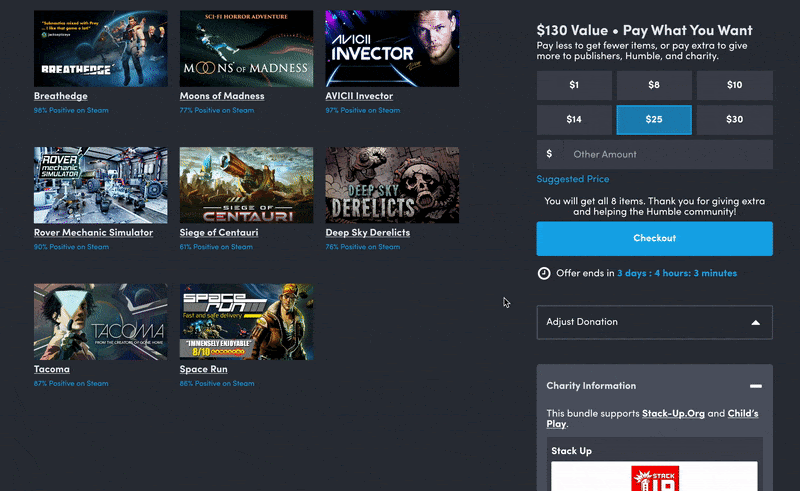Humble Bundle is testing tight new limits on charitable donations
Sliders enabling users to divide payments as they want are being replaced with fixed, and very small, percentages.

Humble Bundle debuted in 2010 with a small-but-cool collection of indie games, and it's grown dramatically over the years since. It now offers multiple game and software bundles simultaneously, has its own full-scale digital storefront, and even operates a monthly subscription service. It's raised a staggering amount of money for charity, too: $195 million so far, a whopping pile of cash for good causes that's still growing.
One of the reasons it's been so successful on that front is that it enables buyers to split up their payments between charity, developers, and the Humble Bundle itself in whatever portions they like. If you want to purchase a collection of games but give all your money to Doctors Without Borders (or whaever), you can—you can even pay more than the asking price if you want to do a solid for your charity of choice.
That may be changing, however, as Humble announced today that it plans to eliminate the digital "sliders" used to apportion payments, and replace them with fixed—and, it appears, very limited—percentages .
Humble revealed in a blog post that, about a month ago, it hid those sliders from some of its users as a test of planned changes to its bundle pages. The sudden disappearance of the sliders, with no warning, apparently caused some confusion, for which the Humble team apologized. "We should have been more proactive in communicating the test," it said.
The testing will continue in May, with "a new bundle page that replaces sliders while also updating the design and adding features that better highlight content." A refresh is probably overdue—Humble pointed out that its bundle pages haven't changed in a decade—but the planned overhaul has a lot of users unhappy, because it appears to include a tight cap on how much they can donate to charity.
"Sliders will be replaced by toggles with defined splits that clearly show what amount of your purchase will support Humble, publishers, and charity," the blog post says. "The 'Extra to Charity' toggle will triple the split for charity to 15%."
An image illustrating the new dropdown menu in action indicates that the default donation setting will allocate five percent to charity, ten percent to Humble, and the remainder to the publishers of the games in the bundle; the "Extra to Charity" option triples the amount to charity—15 percent, which on a $25 bundle is $3.75—and cuts Humble's slice to five percent, while the lion's share still goes to the publishers. Those are the only options listed.
The biggest gaming news, reviews and hardware deals
Keep up to date with the most important stories and the best deals, as picked by the PC Gamer team.

The change has led to some serious backlash on Twitter:
5% is not charity. It's tax deduction.April 23, 2021
If you're reading this, consider contacting the charities you've supported and informing them of what's happening here.Possibly just donate directly as well.Good luck! 🖤April 23, 2021
This is a bad change that weakens the Humble brand and doesn't help consumers, charities, or developers. Please reconsider.April 23, 2021
pic.twitter.com/bUScrnfPx5April 23, 2021
There's a somewhat more nuanced conversation afoot on Reddit, where several users have speculated that Humble's open-ended payment options, which have until now allowed buyers to cut out developers and publishers completely, may simply not be viable any longer. Regardless of the reasoning, though, there's no overlooking the fact that it will almost certainly be a loss for charities. Big purchases may represent a relatively small slice of the total, but if charity donations are capped at 15 percent it will almost certainly spell the end of generous users dropping hundreds of dollars on pay-what-you-want bundles and diverting most of it to their charity of choice.
It's possible that this could all change: Humble did describe it as a test, after all, and there are clearly some very negative feelings on the table. Humble hasn't responded publicly to criticism of the change at this point, but I've reached out for comment and will update if I receive a reply.

Andy has been gaming on PCs from the very beginning, starting as a youngster with text adventures and primitive action games on a cassette-based TRS80. From there he graduated to the glory days of Sierra Online adventures and Microprose sims, ran a local BBS, learned how to build PCs, and developed a longstanding love of RPGs, immersive sims, and shooters. He began writing videogame news in 2007 for The Escapist and somehow managed to avoid getting fired until 2014, when he joined the storied ranks of PC Gamer. He covers all aspects of the industry, from new game announcements and patch notes to legal disputes, Twitch beefs, esports, and Henry Cavill. Lots of Henry Cavill.

